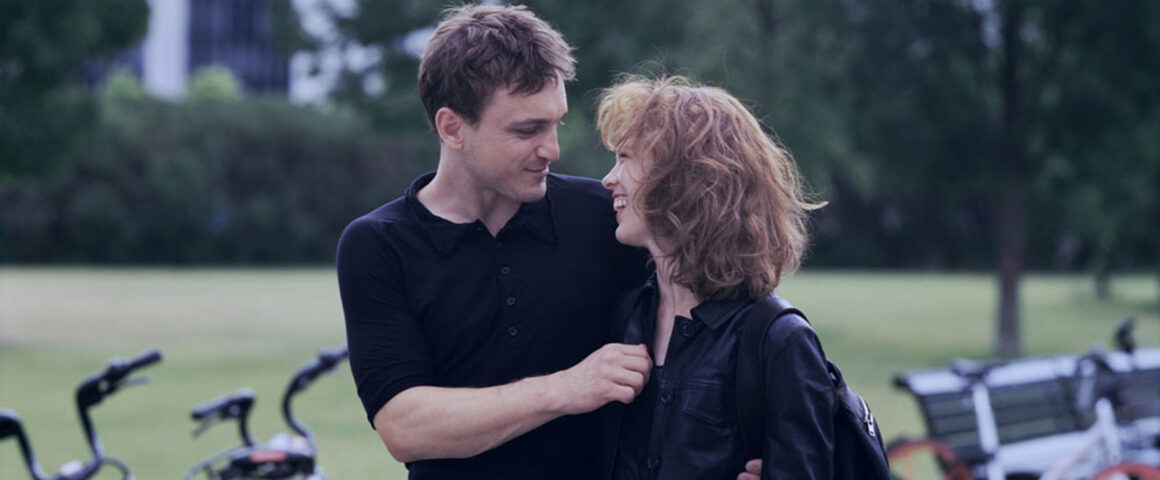“Every possible future points back to and is contained in this moment in time and space, and every possible past culminated in this moment” — Lawrence Tribe
Loosely based on the 19th century novella of Friedrich de la Motte Fouque about an aquatic spirit who must marry a knight to gain a soul, but has to kill him if he is unfaithful, German director Christian Petzold’s (“Transit”) Undine weaves a tale that skirts the edges between romance and fantasy. Reuniting the stars of “Transit,” Paula Beer (“Never Look Away”), winner of the Silver Bear Award at the Berlin Film Festival and Franz Rogowski (“A Hidden Life”), the film seems like a risky departure from the director’s recent work about people caught in the traumatic events of contemporary European history, yet it propels his ideas about timelessness and the notion that the past is always present, even though the form may change.
Set in present-day Berlin, a city that was ironically founded on water, Undine, opens a door to the past with its repetition of the lovely Bach’s adagio from his Concerto in D Minor. Beer is Undine, a free-lance historian and museum guide who lectures international groups on Berlin’s Urban Development project located on Berlin’s Museum Island, connecting the city’s ties to its past. In particular, she talks about the city’s Humboldt Forum project, a partial reconstruction of the demolished 18th century Berlin Palace, explaining that the castle was demolished during the Socialist era and is now being reconstructed.
Without prior knowledge of the fairy tale, which Petzold may assume we all know, Undine’s nature is unclear. She looks and acts human, although there is strangeness about her silences and long, penetrating looks. According to the director, “she is a little bit like a ghost, like a phantom.” Petzold does not reveal Undine’s true nature but clues to her real self emerge when her aloofness and seemingly robotic manner begin to define her presence. In the opening scene, Undine sits outside a Berlin café with her boyfriend, Johannes (Jacob Matschenz, “A Regular Woman”). Johannes threatens to leave her for another woman but is reminded that if he leaves her, she will kill him. Only a half hour later, she runs into Christoph (Rogowski), an industrial diver who has a warm, outgoing personality and Johannes is temporarily forgotten.
After an aquarium tank explodes, they lie together on the floor in a pool of water, dead fish, and broken glass, staring into each other’s eyes. As he picks pieces of glass from her blouse in a scene that is romantic, surreal, and comic, his caring gives her a sense of what it feels like to be loved. Of course, the irony here is that he works underwater, while she, a water spirit, lives and works on land. Though their romance is real, Petzold declared, “They were like two dancers who get very close, but like in tango, they still keep a certain distance, which shows the respect they have for each other.”
The chemistry between them is strong, however, and their relationship can be enjoyed with or without knowledge of the story’s mythological roots. Working underwater, after confronting a giant catfish ostensibly without fear, Christoph sees Undine’s name displayed on an ancient arch deep beneath the surface and takes her diving on their first date to see her name. She momentarily disappears before floating to the surface, her diving apparatus stripped allowing Christof to further bond by resuscitating her. According to legend, if Undine returns to her roots, she must remain there. She is, however, a rule breaker who is not beholden to either legend or men.
Undine is challenging to unravel but in its essence, it is a tribute to the strength and independence of women or, as a recent popular song might put it, to “the power of love.” As Petzold describes it, “Struggling against domination, Undine exists only through men. Then along comes a man, a proletarian, an industrial diver, who interferes with the curse. He is not suspicious; he’s innocent and for the first time seems to see her primarily without any sexual desire and without wanting to dominate her. This is new for her, and a path to a new world seems possible.”




'Movie Review: Undine (2020)' has no comments